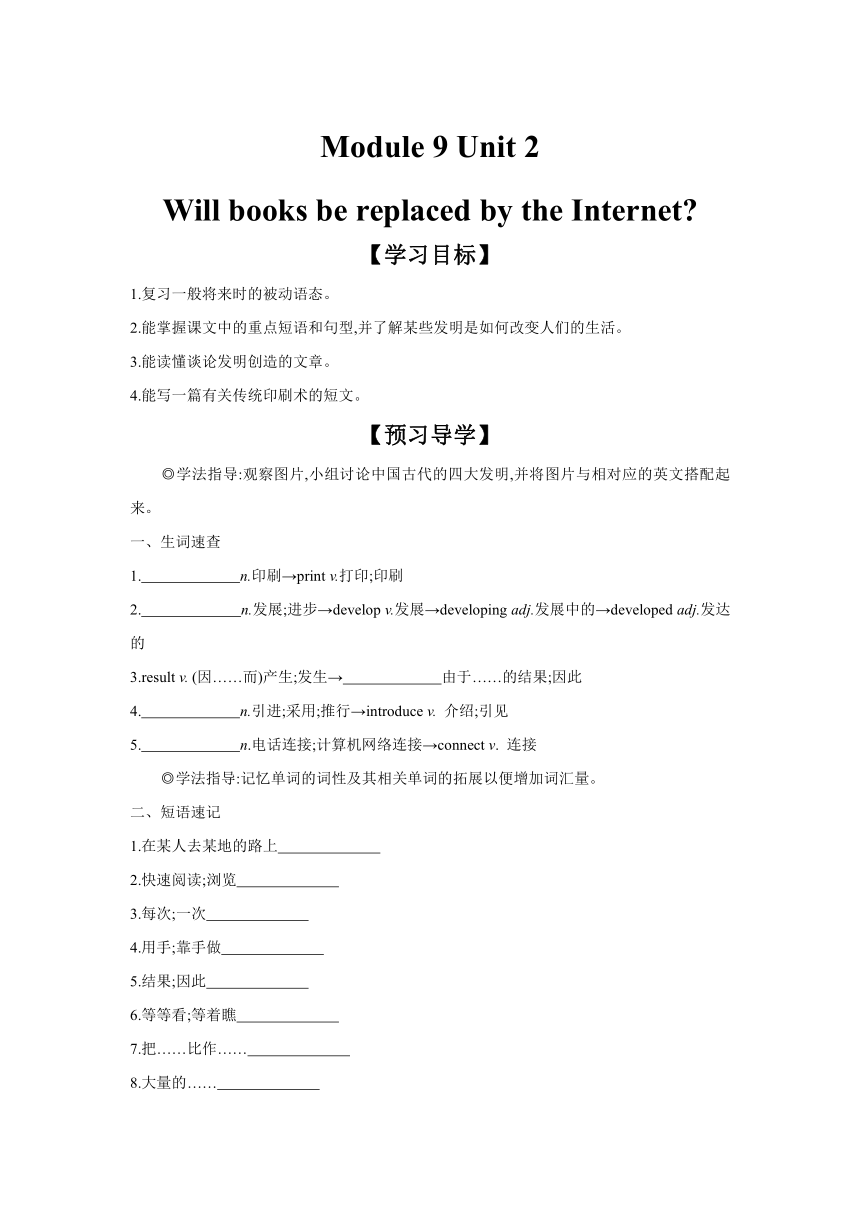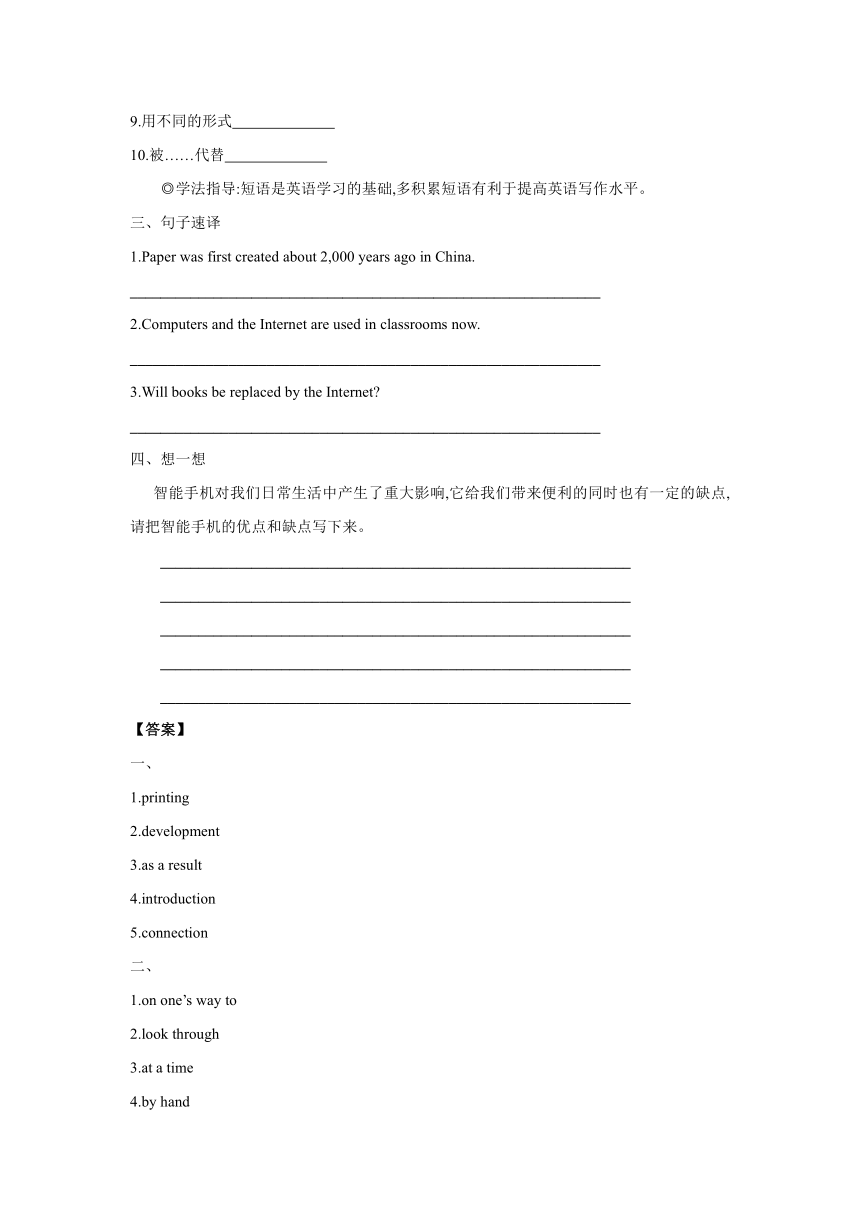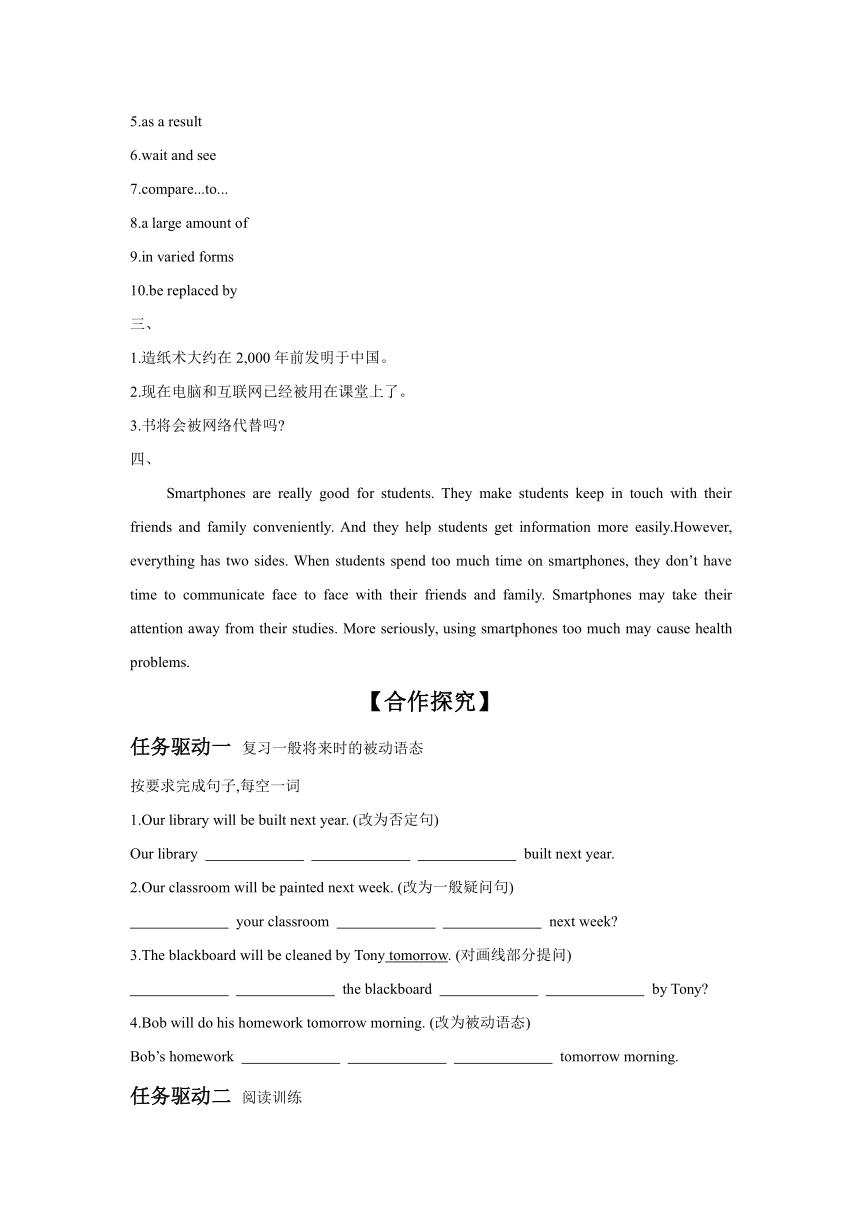外研版九年级上册Module 9 Great inventions Unit 2 学案 (含答案)
文档属性
| 名称 | 外研版九年级上册Module 9 Great inventions Unit 2 学案 (含答案) |

|
|
| 格式 | docx | ||
| 文件大小 | 20.4KB | ||
| 资源类型 | 教案 | ||
| 版本资源 | 外研版 | ||
| 科目 | 英语 | ||
| 更新时间 | 2024-02-26 00:00:00 | ||
图片预览



文档简介
Module 9 Unit 2
Will books be replaced by the Internet
【学习目标】
1.复习一般将来时的被动语态。
2.能掌握课文中的重点短语和句型,并了解某些发明是如何改变人们的生活。
3.能读懂谈论发明创造的文章。
4.能写一篇有关传统印刷术的短文。
【预习导学】
◎学法指导:观察图片,小组讨论中国古代的四大发明,并将图片与相对应的英文搭配起来。
一、生词速查
1. n.印刷→print v.打印;印刷
2. n.发展;进步→develop v.发展→developing adj.发展中的→developed adj.发达的
3.result v. (因……而)产生;发生→ 由于……的结果;因此
4. n.引进;采用;推行→introduce v. 介绍;引见
5. n.电话连接;计算机网络连接→connect v. 连接
◎学法指导:记忆单词的词性及其相关单词的拓展以便增加词汇量。
二、短语速记
1.在某人去某地的路上
2.快速阅读;浏览
3.每次;一次
4.用手;靠手做
5.结果;因此
6.等等看;等着瞧
7.把……比作……
8.大量的……
9.用不同的形式
10.被……代替
◎学法指导:短语是英语学习的基础,多积累短语有利于提高英语写作水平。
三、句子速译
1.Paper was first created about 2,000 years ago in China.
______________________________________________________________
2.Computers and the Internet are used in classrooms now.
______________________________________________________________
3.Will books be replaced by the Internet
______________________________________________________________
四、想一想
智能手机对我们日常生活中产生了重大影响,它给我们带来便利的同时也有一定的缺点,请把智能手机的优点和缺点写下来。
______________________________________________________________
______________________________________________________________
______________________________________________________________
______________________________________________________________
______________________________________________________________
【答案】
一、
1.printing
2.development
3.as a result
4.introduction
5.connection
二、
1.on one’s way to
2.look through
3.at a time
4.by hand
5.as a result
6.wait and see
7.compare...to...
8.a large amount of
9.in varied forms
10.be replaced by
三、
1.造纸术大约在2,000年前发明于中国。
2.现在电脑和互联网已经被用在课堂上了。
3.书将会被网络代替吗
四、
Smartphones are really good for students. They make students keep in touch with their friends and family conveniently. And they help students get information more easily.However, everything has two sides. When students spend too much time on smartphones, they don’t have time to communicate face to face with their friends and family. Smartphones may take their attention away from their studies. More seriously, using smartphones too much may cause health problems.
【合作探究】
任务驱动一 复习一般将来时的被动语态
按要求完成句子,每空一词
1.Our library will be built next year. (改为否定句)
Our library built next year.
2.Our classroom will be painted next week. (改为一般疑问句)
your classroom next week
3.The blackboard will be cleaned by Tony tomorrow. (对画线部分提问)
the blackboard by Tony
4.Bob will do his homework tomorrow morning. (改为被动语态)
Bob’s homework tomorrow morning.
任务驱动二 阅读训练
1.速读Part ②的短文,找出课文中出现的被动语态的句子。
◎学法指导:通过速读课文,找出课文中出现的被动语态的句子,并总结每种时态的被动语态的句式结构。
2.精读Part ②的短文,判断正(T)误(F)。
(1)Paper was first created about 2,000 years ago in China. ( )
(2)During the Tang and Song Dynasties, printing was invented in China. ( )
(3)People can find information more easily on the Internet than in printed forms. ( )
(4)Books will be replaced by the Internet in the future. ( )
3.小组归纳并总结本课的重点短语及日常交际用语。
______________________________________________________________
______________________________________________________________
______________________________________________________________
______________________________________________________________
______________________________________________________________
______________________________________________________________
任务驱动三 写作训练
完成Part ⑦。
◎学法指导:根据Part ⑤和Part ⑥的相关信息写一篇关于传统印刷术及其未来的短文。
______________________________________________________________
______________________________________________________________
______________________________________________________________
______________________________________________________________
______________________________________________________________
【答案】
任务驱动一:
1.will not be
2.Will; be painted
3.When will; be cleaned
4.will be done
任务驱动二:
2.(1)T (2)F (3)T (4)F
3.
on his way to work,look through magazines, on my bedroom wall,be created,be produced, by hand, few people, have the chance to do sth., be invented, make it possible, produce books more quickly and cheaply, spread faster, in the twentieth century, a much larger amount of, be stored, on the Internet, much more easily, smaller and lighter, be replaced...
任务驱动三:
It’s hard to imagine a world without printing because we have so many printed things now. Paper was first created about 2, 000 years ago, but books weren’t printed at that time. They were written by hand, so few books were produced, and, as a result, few people could read.
Printing was invented during the Sui and Tang Dynasties. After printing developed, books became cheaper, so more people learnt how to read.
Today, the Internet is growing very fast. A much larger amount of information can be stored in more varied forms on the Internet than in books. As a result the Internet will probably be more important than printing in the future.
Now the Internet is growing very puters and the Internet are used in classrooms now, and newspapers and magazines are read online.
【知识超市】
[命题点一]Later, developments in printing made it possible to produce books more quickly and cheaply.随后,印刷术的发展使书的印制快了许多,也便宜了许多。
【例句呈现】
1.With the development of the science and technology, mobile phones are cheaper and cheaper. 随着科学技术的发展,手机越来越便宜。
2.China is a developing country. 中国是一个发展中国家。
3.Japan is a developed country. 日本是一个发达国家。
4.We should develop good eating habits. 我们应该养成良好的饮食习惯。
【易混辨析】development作名词,意为“发展”; developing作形容词,意为“发展中的”;developed作形容词,意为“发达的”;develop作动词,意为“发展;开发”。
对点自测
选词填空
development, develop, developing, developed
1. countries are usually rich.
2.The company is still .
3.With the of our country, our life will become better and better.
4.It is important to good study methods.
【答案】
1.Developed 2.developing 3.development 4.develop
[命题点二]In a way, we can compare the invention of paper and printing to the introduction of the Internet in the twentieth century.在某种程度上,我们可以将造纸术和印刷术的发明与二十世纪互联网的引入相媲美。
【例句呈现】
1.People usually compare teachers to candles. 人们通常把老师比作蜡烛。
2.You can’t compare the mouse with the elephant. 你不能把老鼠与大象相比较。
【易混辨析】compare...to...把……比作……;compare...with...把……和……相比较。
对点自测
根据中文完成句子,每空一词
1.不要总是把自己与其他人相比较。
Don’t yourself others.
2.这个小姑娘经常把月亮比作小船。
The little girl often the moon the boat.
【答案】
1.compare; with
2.compares; to
Will books be replaced by the Internet
【学习目标】
1.复习一般将来时的被动语态。
2.能掌握课文中的重点短语和句型,并了解某些发明是如何改变人们的生活。
3.能读懂谈论发明创造的文章。
4.能写一篇有关传统印刷术的短文。
【预习导学】
◎学法指导:观察图片,小组讨论中国古代的四大发明,并将图片与相对应的英文搭配起来。
一、生词速查
1. n.印刷→print v.打印;印刷
2. n.发展;进步→develop v.发展→developing adj.发展中的→developed adj.发达的
3.result v. (因……而)产生;发生→ 由于……的结果;因此
4. n.引进;采用;推行→introduce v. 介绍;引见
5. n.电话连接;计算机网络连接→connect v. 连接
◎学法指导:记忆单词的词性及其相关单词的拓展以便增加词汇量。
二、短语速记
1.在某人去某地的路上
2.快速阅读;浏览
3.每次;一次
4.用手;靠手做
5.结果;因此
6.等等看;等着瞧
7.把……比作……
8.大量的……
9.用不同的形式
10.被……代替
◎学法指导:短语是英语学习的基础,多积累短语有利于提高英语写作水平。
三、句子速译
1.Paper was first created about 2,000 years ago in China.
______________________________________________________________
2.Computers and the Internet are used in classrooms now.
______________________________________________________________
3.Will books be replaced by the Internet
______________________________________________________________
四、想一想
智能手机对我们日常生活中产生了重大影响,它给我们带来便利的同时也有一定的缺点,请把智能手机的优点和缺点写下来。
______________________________________________________________
______________________________________________________________
______________________________________________________________
______________________________________________________________
______________________________________________________________
【答案】
一、
1.printing
2.development
3.as a result
4.introduction
5.connection
二、
1.on one’s way to
2.look through
3.at a time
4.by hand
5.as a result
6.wait and see
7.compare...to...
8.a large amount of
9.in varied forms
10.be replaced by
三、
1.造纸术大约在2,000年前发明于中国。
2.现在电脑和互联网已经被用在课堂上了。
3.书将会被网络代替吗
四、
Smartphones are really good for students. They make students keep in touch with their friends and family conveniently. And they help students get information more easily.However, everything has two sides. When students spend too much time on smartphones, they don’t have time to communicate face to face with their friends and family. Smartphones may take their attention away from their studies. More seriously, using smartphones too much may cause health problems.
【合作探究】
任务驱动一 复习一般将来时的被动语态
按要求完成句子,每空一词
1.Our library will be built next year. (改为否定句)
Our library built next year.
2.Our classroom will be painted next week. (改为一般疑问句)
your classroom next week
3.The blackboard will be cleaned by Tony tomorrow. (对画线部分提问)
the blackboard by Tony
4.Bob will do his homework tomorrow morning. (改为被动语态)
Bob’s homework tomorrow morning.
任务驱动二 阅读训练
1.速读Part ②的短文,找出课文中出现的被动语态的句子。
◎学法指导:通过速读课文,找出课文中出现的被动语态的句子,并总结每种时态的被动语态的句式结构。
2.精读Part ②的短文,判断正(T)误(F)。
(1)Paper was first created about 2,000 years ago in China. ( )
(2)During the Tang and Song Dynasties, printing was invented in China. ( )
(3)People can find information more easily on the Internet than in printed forms. ( )
(4)Books will be replaced by the Internet in the future. ( )
3.小组归纳并总结本课的重点短语及日常交际用语。
______________________________________________________________
______________________________________________________________
______________________________________________________________
______________________________________________________________
______________________________________________________________
______________________________________________________________
任务驱动三 写作训练
完成Part ⑦。
◎学法指导:根据Part ⑤和Part ⑥的相关信息写一篇关于传统印刷术及其未来的短文。
______________________________________________________________
______________________________________________________________
______________________________________________________________
______________________________________________________________
______________________________________________________________
【答案】
任务驱动一:
1.will not be
2.Will; be painted
3.When will; be cleaned
4.will be done
任务驱动二:
2.(1)T (2)F (3)T (4)F
3.
on his way to work,look through magazines, on my bedroom wall,be created,be produced, by hand, few people, have the chance to do sth., be invented, make it possible, produce books more quickly and cheaply, spread faster, in the twentieth century, a much larger amount of, be stored, on the Internet, much more easily, smaller and lighter, be replaced...
任务驱动三:
It’s hard to imagine a world without printing because we have so many printed things now. Paper was first created about 2, 000 years ago, but books weren’t printed at that time. They were written by hand, so few books were produced, and, as a result, few people could read.
Printing was invented during the Sui and Tang Dynasties. After printing developed, books became cheaper, so more people learnt how to read.
Today, the Internet is growing very fast. A much larger amount of information can be stored in more varied forms on the Internet than in books. As a result the Internet will probably be more important than printing in the future.
Now the Internet is growing very puters and the Internet are used in classrooms now, and newspapers and magazines are read online.
【知识超市】
[命题点一]Later, developments in printing made it possible to produce books more quickly and cheaply.随后,印刷术的发展使书的印制快了许多,也便宜了许多。
【例句呈现】
1.With the development of the science and technology, mobile phones are cheaper and cheaper. 随着科学技术的发展,手机越来越便宜。
2.China is a developing country. 中国是一个发展中国家。
3.Japan is a developed country. 日本是一个发达国家。
4.We should develop good eating habits. 我们应该养成良好的饮食习惯。
【易混辨析】development作名词,意为“发展”; developing作形容词,意为“发展中的”;developed作形容词,意为“发达的”;develop作动词,意为“发展;开发”。
对点自测
选词填空
development, develop, developing, developed
1. countries are usually rich.
2.The company is still .
3.With the of our country, our life will become better and better.
4.It is important to good study methods.
【答案】
1.Developed 2.developing 3.development 4.develop
[命题点二]In a way, we can compare the invention of paper and printing to the introduction of the Internet in the twentieth century.在某种程度上,我们可以将造纸术和印刷术的发明与二十世纪互联网的引入相媲美。
【例句呈现】
1.People usually compare teachers to candles. 人们通常把老师比作蜡烛。
2.You can’t compare the mouse with the elephant. 你不能把老鼠与大象相比较。
【易混辨析】compare...to...把……比作……;compare...with...把……和……相比较。
对点自测
根据中文完成句子,每空一词
1.不要总是把自己与其他人相比较。
Don’t yourself others.
2.这个小姑娘经常把月亮比作小船。
The little girl often the moon the boat.
【答案】
1.compare; with
2.compares; to
同课章节目录
- Module 1 Wonders of the world
- Unit 1 It's more than 2,000 years old.
- Unit 2 The Grand Canyon was not just big.
- Unit 3 Language in use
- Module 2 Public holidays
- Unit 1 My family always go somewhere interesting a
- Unit 2 We have celebrated the festival since the f
- Unit 3 Language in use
- Module 3 Heroes
- Unit 1 She trained hard,so she became a great play
- Unit 2There were few doctors, so he had to work ve
- Unit 3 Language in use
- Module 4 Home alone
- Unit 1 I can look after myself, although it won’t
- Unit 2 I became so bored with their orders that I
- Unit 3 Language in use
- Module 5 Museums
- Unit 1 Don't cross that rope!
- Unit 2 If you ever go to London, make sure you vis
- Unit 3 Language in use
- Module 6 Problems
- Unit 1 If I start after dinner, I'll finish it be
- Unit 2 If you tell him the truth now, you will sho
- Unit 3 Language in use
- Revision Module A
- Module 7 Great books
- Unit 1 We're still influenced by Confucius's idea
- Unit 2 It is still read and loved.
- Unit 3 Language in use
- Module 8 Sports life
- Unit 1 Daming wasn't chosen for the team last time
- Unit 2 He was invited to competitions around the w
- Unit 3 Language in use
- Module 9 Great inventions
- Unit 1 Will computers be used more than books in t
- Unit 2 Will books be replaced by the Internet?
- Unit 3 Language in use
- Module 10 Australia
- Unit 1 I have some photos that I took in Australia
- Unit 2 The game that they like most is Australian
- Unit 3 Language in use
- Module 11 Photos
- Unit 1 He's the boy who won the photo competition
- Unit 2 The photo which we liked best was taken by
- Unit 3 Language in use
- Module 12 Save our world
- Unit 1 If everyone starts to do something, the wor
- Unit 2 Repeat these three words daily: reduce, reu
- Unit 3 Language in use
- Revision Module B
